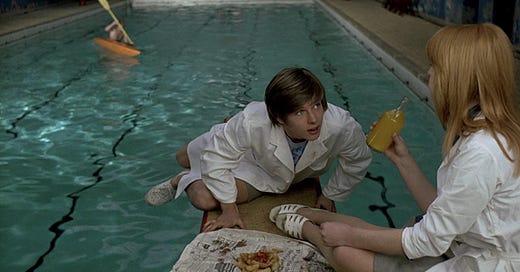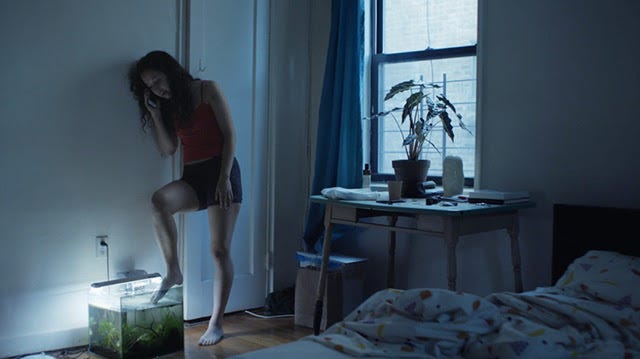i. short takes
ii. double feature: mumblecore-ish
iii. Cafe Mutton and Dept of Culture
The Polish director Jerzy Skolimowski has made over 15 feature films. At least two of them feature a hotdog vendor, a subtle pop of Americana incongruous to the setting, 70s London in one film, current Warsaw in another. These days the 84-year-old director no longer eats meat, he told me, when I chatted with him about his latest movie EO, a propulsive and visually wondrous tale of donkey, which opens today. You can read the full interview and more about the film on Screen Slate.
SHORT TAKES
A few of Skolimowski’s movies are streaming for free on Plex.
DEEP END (1970): A 15-year-old boy working as a public bathhouse attendant develops a dangerously jealous crush on his older co-worker. It telegraphs the ickier parts of the human psyche through eerie angles, vibrant splashes of color, and a soundtrack by CAN back when they were called The Can.
11 MINUTES (2015): A vicious collision of strangers’ lives, a cutting rejoinder to soppy encouragers like Babel or Crash.
ESSENTIAL KILLING (2010): The second most compelling depiction of running lost in the woods with only one shoe since the “Pine Barrens” episode of the Sopranos. Vincent Gallo plays Taliban soldier captured in Iraq and cosmically released into the Eastern European wilderness during bungled transport. Gallo’s features become a nondescript canvas, as the character’s ethnicity/nationality is never made explicit. Skolimowski’s resistance to politicizing is what in fact renders the film political.
I USED TO GO HERE
Kris Rey, 2020
To allow Gillian Jacobs to be on screen that long without getting weird is a crime. The movie uses her to lean into all her broad appeal playing a writer, invited to speak at her alma mater at the behest of her dreamy lit professor played by Jemaine Clement who isn’t allowed to make enough jokes. Sales of her debut novel are virtually nonexistent, her ex doesn’t answer her calls, so she takes up with the three college boys living in her former university house.
Impressively though, this low-stakes third-life crisis movie doesn’t ride the nostalgia factor of visiting your old stomping grounds, though maybe it should’ve. It’s an earnest picture that’s a bit too square to compete with the likes of humanists Stephen Cone or Paul Harrill. It feels like all the actors are talking down to you, sort of the opposite dialogue-style you’ll encounter in the movies of Joe Swanberg, to whom Kris Rey is married. Instead I Used to go Here unexpectedly feels like a Judd Apatow picture, since it exudes the same feigned restraint of those comedy-memoirs, straight-edge dramas masquerading as comedies swaddled in glossy camera work. Also streaming on Plex.
ACTUAL PEOPLE
Kit Zauhar, 2022
Kit Zauhar picks up the existential mantle of adulthood where Lena Dunham and mumblecore left off, crafting her own uniquely biting tale of youth adrift. She co-opts the early aughts subgenre, historically the realm of white-male navel-gazing, and highlights her own college-age experiences studded with microaggressions as a BIPOC woman.
Riley, a college senior at an unnamed NYC college, fails her last class just as she’s about to graduate and ambles her last few weeks between Brooklyn and Philly attending house parties, dealing with a hot older-dude roommate, and pursuing a boy she’s been hooking up with. Riley, played by Zauhar, is biracial (Asian), and so is her crush who is less engaged in their shared truth.
As someone wrote their thesis on mumblecore, I’m bound to have thrilled to Zauhar’s autofiction, and watching Actual People I realized how far removed I am from that miasma of uncertainty. (In other words, I am older now.) I’m struck by the sheer presence of Asian actors in these alternative roles, rare in the indie world still. Pulled by the undertow of responsibility and parental disappointment, Riley’s world lacks the distinct ardor of aggrandizing privilege, which divorces Zauhar’s film from Lena et. all.
Unlike the ladies of Tiny Furniture or Girls (Zosia Mamet is one of the producers here) those depicted in Actual People are appropriately vexed, but not necessarily vexing; what they lack in self-awareness they don’t compensate for with messy self-absorption. They stew, sometimes obliviously and physically, in their own discomfort—a yeast infection plagues Riley for much of the film—and the prevalence of screens heightens the ambient chaos.
Interlacing the narrative are iPhone-clips of Riley’s peers and acquaintances, skateboarding, jumping up on the couch, as well as texts read in voice-over. “It was special, but it wasn’t significant,” Riley’s crush says—an appropriate encapsulation of the Gen-Z mindset, beset by the glare of social media. Streaming on MUBI.
CAFE MUTTON
For solid proof that 6pm is the new 8pm, look no further than Cafe Mutton upstate. I erroneously read the opening time by half an hour and unfortunately for us, the 30 minute error cost 90 additional minutes of waiting. Turns out I hadn’t needed to let my partner linger over a second smoked lager at Suarez Brewing beforehand.
Around the corner from Lil Deb’s Oasis in the center of Hudson, an uppity cross between Cobble Hill and Connecticut (where Joan Didion’s used enamelware is on display for auction), this corner lot restaurant could not be more different in tone and food. Mostly a morning spot, the funghi-adorned cafe operates its only dinner service on Fridays, presumably accounting for the throng of people zagging through the dining room. I was so looking forward to the tortellone with black trumpet mushrooms, but overheard it had already sold out.
You order at the counter, let the staff know where you’re sitting (bar stools outfitting the perimeter, benches a plenty outside, and a few round cafe tables for two in front of the window), and they’ll bring you the food without the aid of any numbered markers, just on account of good old-fashioned memory and the occasional shout.
If the tables are full, as they were the night I went, they’ll take your name, call you when something opens up, and bring you back up to order again—much to the piercing chagrin of whoever’s next on line. The process, when you think about it, is not unlike sending mail at the Post Office. Fortunately for us, they were much nicer here.
The hybrid counter/table-service model could use some work, though it elides the need for reservation systems and, in theory, alleviates the diner’s need to dutifully hawk-eye open seats. But, if you, like me, are neurotic to a tee and unable to anticipate a fair and happy end, you may not be able to help yourself. Barely cognizant of conversation I scanned the room with unceasing vigilance for signs of departure. I did manage to avoid staring at a lauded theater actor who appears in Succession, neatly camouflaged by her fellow graying seniors accompanied by their adult children.
Two rum punches assuaged my impatience until we were seated. I ravaged a baguette spread thick with uni butter and adorned with daikon, an early aughts throwback that feels neither nostalgic nor outdated, just eminently craveable. It took everything in me not to order another.
The menu at Cafe Mutton changes weekly, and it is both elegantly haphazard and gratifyingly weird. There was concord grape jell-o with whipped cream for dessert, and in the past they’ve cooked with Vegemite. The
They give equal billing to both vegetable and animal—favoring off-cuts in particular, pork trotters, lamb head, beef tongue. But on the night I went it was simply duck confit, neatly served on Mikasa dessert plates. Double-wide ribbons of tagliatelle were sluiced with juice of oysters mushrooms, serviceable, and half a butternut squash was spiked with marjoram and crushed peppers, and showered with fried onion ringlets, better.
I’m eager to try brunch, but I’d be lying if I said I wasn’t wary of the wait. What I’ll remember for now, though, is the simply stewed broccoli rabe, broth-logged with intense flavor, and the young couple, clear Manhattanites, toting along a Dachshund fitted with a Supreme hoodie, the LV logo version.
illicit dairy at DEPT. OF CULTURE
If you still prefer to eat at 8pm, then may I suggest this Nigerian tasting-menu spot, where dinner and revelry can match past 11pm? We seated ourselves at the communal oak table, where the other diners weren’t particularly loquacious but also not opposed to exchanging jokes or mutual praise for the provincial Nigerian fare laid before us. It’s the ideal setting to catch up with a friend or make another, one of which might be the jovial chef-owner himself, Ayo Balogun, who thoughtfully elucidates each dish and generously banters with his guests.
I wish I’d taken notes of everything I’d eaten, like an intensely peppery goat stew that began the meal, since the dishes shift based on what Balogun can gets his hands on. Almost always on offer though, is some version of wara, Nigerian cheese made with raw milk, procured by crossing state lines to Connecticut where unpasteurized dairy is legal. Bathed in obe ata, a red pepper and tomato amalgam, you might consider the orange-sized ball of cheese curds as a substitute meatball. I, personally, would vote for this dreamy combo to replace the prosaic menu-plaguing burrata and tomato.












Oh wow. When do we get to read that mumblecore thesis paper?